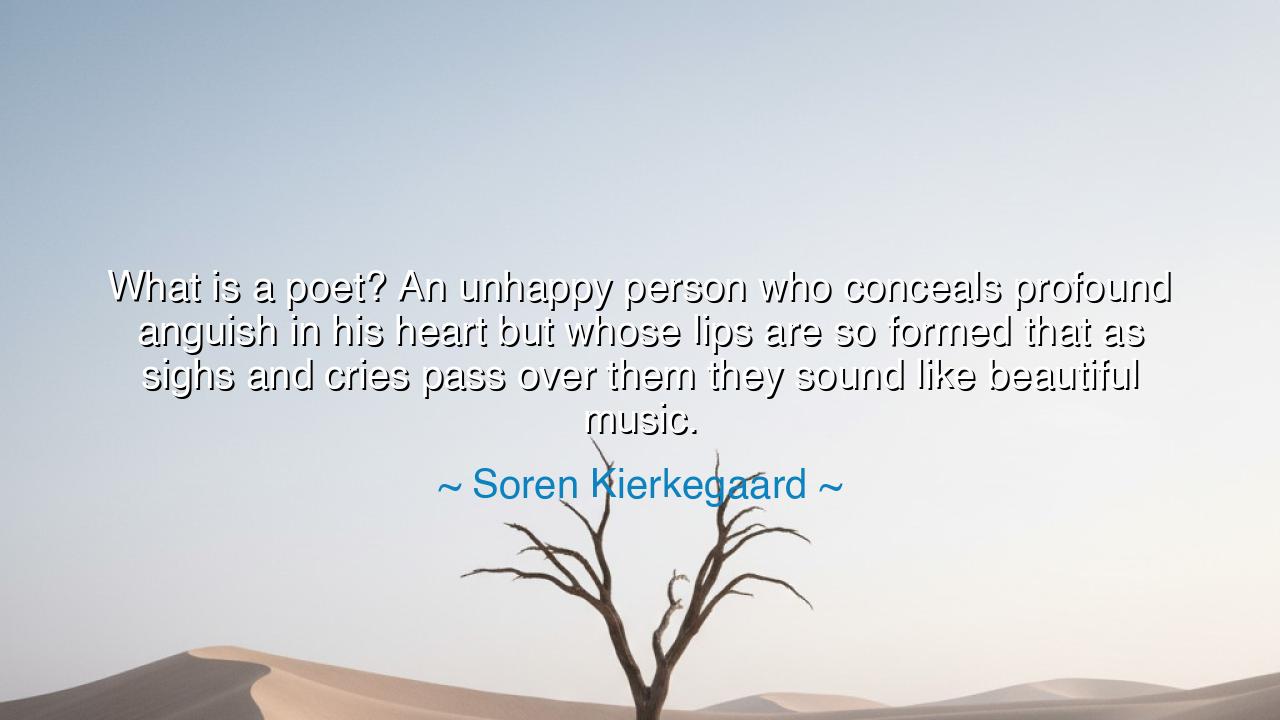
What is a poet? An unhappy person who conceals profound anguish
What is a poet? An unhappy person who conceals profound anguish in his heart but whose lips are so formed that as sighs and cries pass over them they sound like beautiful music.






The philosopher Soren Kierkegaard once gave voice to a truth that burns like a hidden flame: “What is a poet? An unhappy person who conceals profound anguish in his heart but whose lips are so formed that as sighs and cries pass over them they sound like beautiful music.” In these words, we are shown the paradox of the poet’s soul—that suffering is transfigured into beauty, and tears become songs that uplift even as they are born of despair.
The poet is not merely a writer of verses, but a vessel through which sorrow is refined into light. Within his chest lies the storm of anguish, too heavy to carry in silence. Yet when his grief escapes through the lips, it does not emerge as raw lamentation, but as music—sweet, haunting, and filled with power to move the hearts of others. The world hears beauty, but it seldom perceives the agony that gave birth to it. Thus, the poet suffers alone, while those who hear his words are comforted and inspired.
Think upon the life of Edgar Allan Poe, whose heart was weighed down by death, loss, and poverty. His verses carried the echoes of mourning—The Raven, Annabel Lee, Ulalume—songs of sorrow clothed in haunting rhythm. To his readers, these poems were masterpieces of beauty and genius. But behind them lay a man crushed by anguish, his sighs and cries masked by form and meter. In him, Kierkegaard’s vision is made flesh: anguish transformed into art, pain concealed yet revealed through melody.
The ancients, too, knew this truth. The story of Orpheus speaks again: his lyre sang of love lost, and even stones and rivers wept at his song. His grief was unbearable, yet when released as music, it became irresistible beauty. The poet is, in essence, an Orpheus reborn—his suffering a seed that blossoms into art, his tears the water that nourishes creation. The poet’s burden is heavy, yet through it, the world is made richer, more tender, more human.
But heed this wisdom: not only the great names of history carry this role. In every age, there are unseen poets—those who live in quiet sorrow, yet whose words, songs, or deeds bring solace to others. Perhaps you have met such souls: a friend whose laughter masks pain, yet whose words give hope to the brokenhearted; an artist whose brushstrokes shine with beauty even as they are born from nights of despair. These, too, are poets in Kierkegaard’s sense, transforming anguish into light for the world.
The lesson, therefore, is twofold. First: recognize that suffering, when expressed with honesty, can become a source of healing—not only for you, but for others. Your sighs may sound like cries to your own ears, but to another, they may sound like music. Do not despise your pain, but learn to shape it, refine it, and give it form. Second: do not envy the poet’s gift without understanding the price. Behind every beautiful song may lie a soul that bleeds. Approach such beauty with reverence, for it is born of sacrifice.
And so, O seekers of wisdom, when sorrow comes—and it will—do not bury it in silence, nor let it consume you in bitterness. Instead, strive to turn your grief into song, your anguish into art, your pain into a gift that others may cherish. Whether through words, deeds, or simple acts of compassion, let your sighs pass through lips formed by grace, so that the world hears not only your sorrow, but the music of your humanity.
Thus, remember always: the poet teaches us that even the deepest anguish can be transfigured into beauty. And if you carry sorrow in your heart, let it not wither you, but let it become the source of your song. For in this, you join the eternal company of those who, though unhappy within, gave to the world the sweetest of gifts—the sound of beautiful music born from tears.






AAdministratorAdministrator
Welcome, honored guests. Please leave a comment, we will respond soon